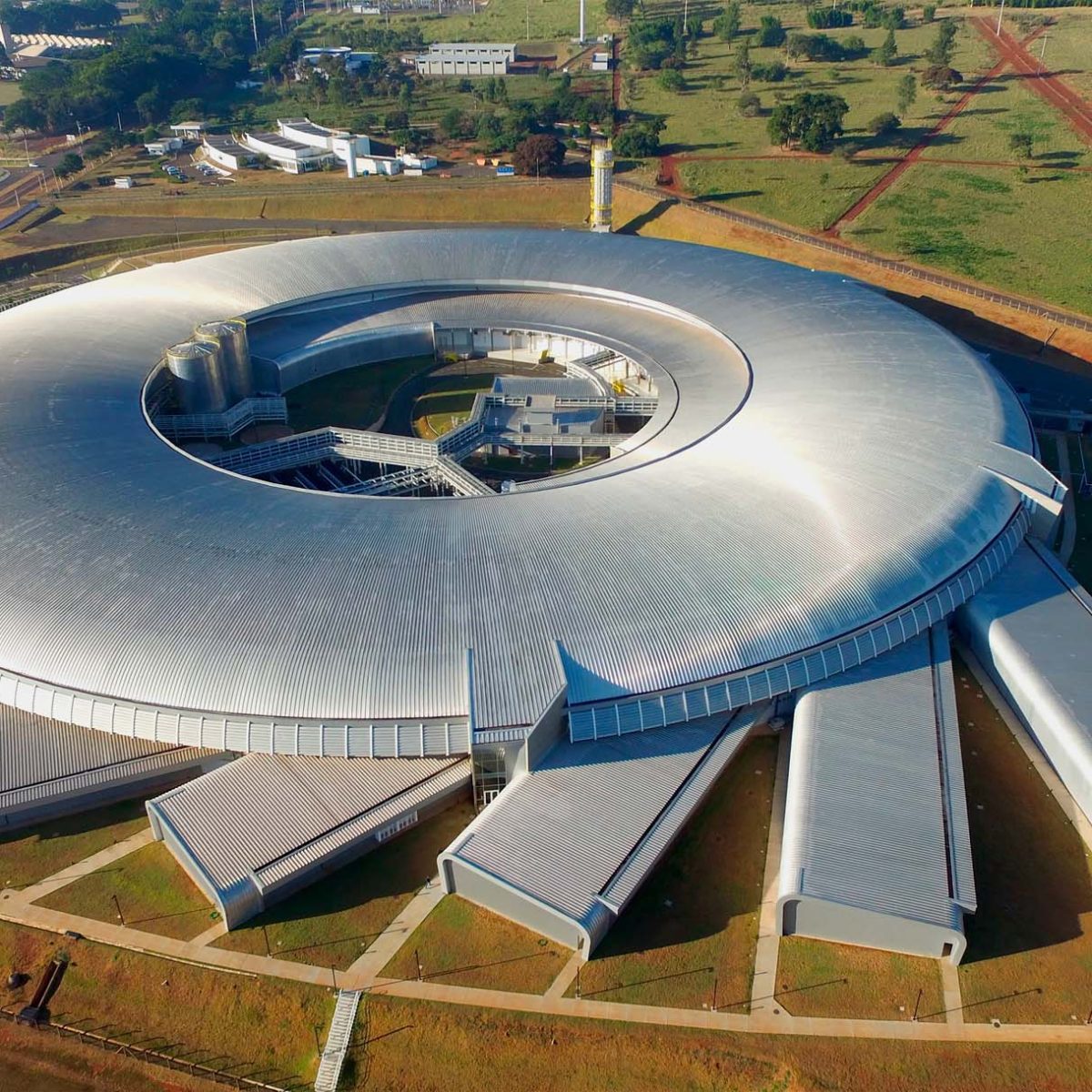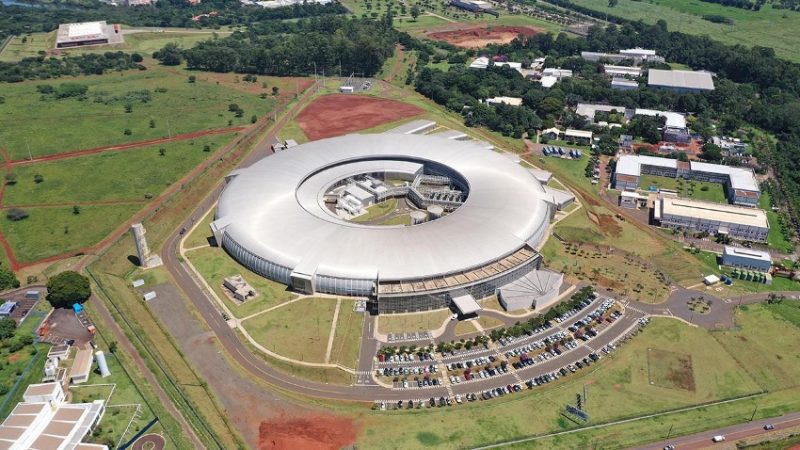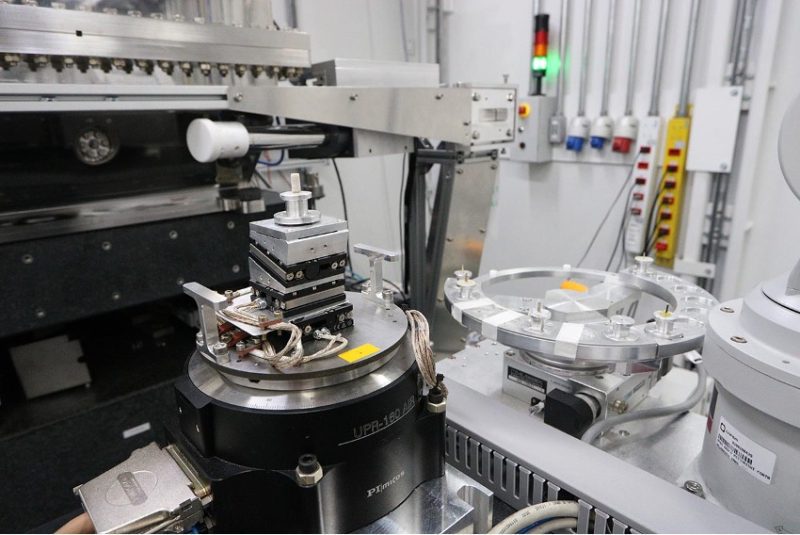
Visão aérea do Sirius em 2022 (Divulgação/CNPEM)
Sirius, the Brazilian particle accelerator, will play a leading role in projects with research centers and universities
Equinor announced on August 10 that it will invest approximately R$ 42 million in research and development projects, with roughly R$ 22 million dedicated to developing part of the infrastructure of one of the research stations at Sirius, the particle accelerator at the Brazilian Center for Research in Energy and Materials (CNPEM). The remainder of the funds will be invested in partnerships with the University of Campinas (UNICAMP) and the Federal University of Santa Catarina (UFSC) for research targeting the oil and gas sector.

Sirius, the particle accelerator operated by CNPEM, will be utilized to observe the interaction between different fluids and rock (CNPEM Outreach)
These initiatives will evaluate the potential for upgrading simulations of reservoirs based on digital tools, for example, the relationships between the physical properties of different rocks in petroleum reservoirs, and the impact of interactions between rock and fluids involved in extraction processes.
“Investing in technology and innovation is crucial to optimize the oil and gas sector, accelerate projects in renewable energy, and develop low-carbon solutions, in line with our global strategy. To this end, we have worked to encourage the development of solutions that contribute to the efficiency of our operations at the same time that we are stimulating science in our country,” states Veronica Coelho, Country Manager for Equinor in Brazil.
“Carrying out research in partnerships with institutions recognized for expertise in their areas, like CNPEM, UNICAMP, and UFSC, produces technical knowledge and valuable solutions applied to Equinor’s projects,” says Andrea Achôa, RD&I manager at Equinor in Brazil.
The partnership with the three institutions has complementary scopes that integrate with the “superproject” that is Sirius, with investments in expanding infrastructure and research activities. Equinor, in partnership with CNPEM, UNICAMP, and UFSC, will utilize Brazil’s largest and most complex scientific infrastructure to deepen knowledge about exploration and production activities.
The R&D collaboration with UNICAMP will assess the properties of the rocks that exist in the pre-salt layer, mainly with regard to porosity, permeability, and their behavior when they are in contact with different fluids. Rock samples will be sent to CNPEM for study in the Mogno research station at Sirius and compared to data collected at the Oil Reservoir Laboratory (LABORE) at UNICAMP’s School of Mechanical Engineering.

High-resolution three-dimensional tomographic images will be obtained using the Mogno beamline (CNPEM Outreach)
“This partnership continues what we started in 2013, when LABORE led two of the three projects between Equinor and UNICAMP. This cooperation reinforces the training of highly-qualified human resources through the multidisciplinary graduate course in petroleum science and engineering that is managed jointly by the Schol of Mechanical Engineering and the Department of Geosciences, with support from CEPETRO,” says Rosangela B. Z. L. Moreno, coordinator of the project at UNICAMP. “The joint research projects have had a positive impact on the development of new technologies that benefit the energy sector and, in turn, society,” adds Marcelo Souza de Castro, Director of CEPETRO, the Center for Petroleum Studies.
Also, to observe the phenomena of different fluids interacting with rock, the collaboration with UFSC will involve studies on the use of reservoir rocks in the pre-salt layer to develop a digital protocol for these samples. These experiments, which are part of another R&D project, will be compared to images generated at Sirius using advanced microtomography techniques. The goal of this initiative is to perfect the codes for numeric simulation of the outflow of fluids in porous mediums, which is routinely used in Equinor’s operations.
“The partnership with Equinor, UNICAMP, and CNPEM reinforces UFSC’s commitment to high-quality science and technology and its applications in industry, an important characteristic in the identity of our university. This project is especially relevant because of its high degree of internationalization, connecting us with a multinational company that works in a strategic sector of the Brazilian economy and with researchers from various countries,” notes Jacques Mick, Dean for Research and Innovation at UFSC.
The collaboration with CNPEM, in turn, involves carrying out infrastructure projects for the Mogno beamline, which is currently in the testing phase at Sirius. Mogno is designed for research involving X-ray micro- and nanotomography, generating three-dimensional images in just seconds and in continuous zoom, which makes it possible to study the same sample at both high and low resolution.
The experiments that will be conducted in partnership with Equinor on the Mogno beamline will benefit from the characteristics that make Sirius a cutting-edge synchrotron light source with high brilliance. The researchers involved in these projects will gain a better understanding of the dynamics of how fluids flow through the pores of reservoir rock, which contributes to advanced recovery of petroleum, for example.
“This project will make it possible to implement a new experimental project in the current Mogno beamline microstation, in order to obtain three-dimensional images at high resolution under in situ and operando conditions. In these experiments, the rock samples can be analyzed in conditions similar to those in petroleum reservoirs, during injection of different fluids into the porous environments of these rocks,” explains Harry Westfahl Jr., director of the Brazilian Synchrotron Light National Laboratory (LNLS) at CNPEM.
Equinor is an international energy company headquartered in Norway. It is one of the world’s largest offshore operations, and is increasingly working with renewable energy. The company has operated in Brazil since 2001 with a diversified, robust portfolio that includes oil and gas assets such as the Peregrino, Bacalhau, and BM-C-33 projects, as well as solar energy operations: the Apodi complex, the first solar plant in the company’s global portfolio, which has been functioning since 2018 in Ceará, and the Mendubim solar project which is under construction in Rio Grande do Norte.
The Center for Petroleum Studies, which manages the UNICAMP partnership, was founded at the University of Campinas in 1987. Solid training in basic science and experience in partnerships with industry make CEPETRO an institution of excellence in research and teaching in the oil and gas sector and, more recently, in energy in broader terms. CEPETRO stands out as one of the largest centers for energy research in the country, with superb physical and laboratory structure in its own facilities and in associated laboratories, technical and scientific staff qualified in various knowledge areas, and partnerships with various energy companies in Brazil and teaching and research institutions in Brazil and abroad.
In this edition, RAU will be held in November and will feature 4 satellite events.
40 high school teachers gathered for a week of immersion in the cutting-edge research and development environment at the Brazilian Center for Research in Energy and Materials (CNPEM)